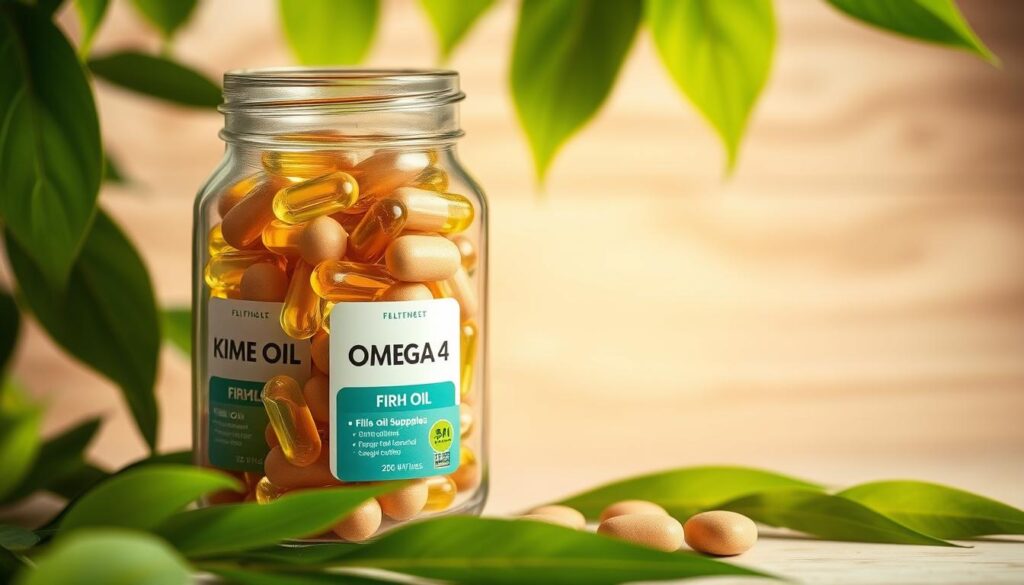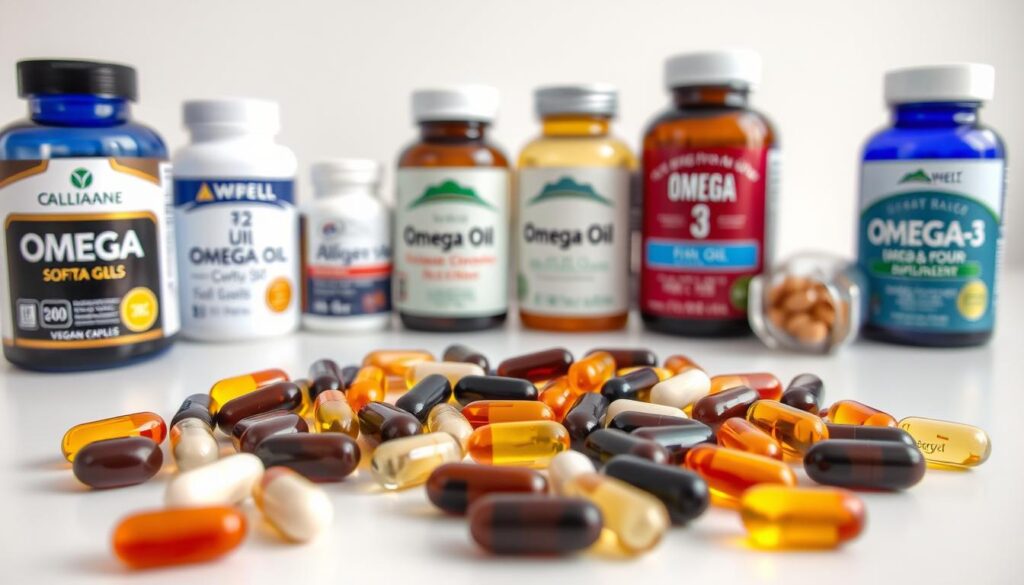Omega-3 Sources to Ease Menopausal Inflammation
The night sweats wake you at 3 AM again. Your joints ache when you climb out of bed. The mood swings leave you feeling like a stranger in your own body.
If this sounds familiar, you’re not alone. Over 80% of women experience these challenging symptoms during menopause.
Your body is going through profound changes, and inflammation plays a bigger role than you might realize. The good news is that omega-3 fatty acids menopause solutions can make a real difference in how you feel each day.
These powerful nutrients work as natural anti-inflammatory supplements that target the root causes of your discomfort.

Essential fatty acids like EPA, DHA, and ALA can’t be made by your body. You need to get them from food or supplements.
Without enough omega-3s, menopausal symptoms relief becomes much harder to achieve. Many women don’t realize that persistent insomnia affects 30-44% of those with moderate to severe hot flashes and night sweats.
Depression touches over 20% of women during this transition. Research shows omega-3s help balance the brain chemicals that regulate mood and sleep.
These natural menopause remedies support your serotonin and dopamine systems, helping you feel more like yourself again.
This guide will show you the best omega-3 sources and how to use them effectively. You’ll discover which foods and supplements work best for your specific symptoms.
Together, we’ll explore science-backed strategies to help you navigate menopause with greater comfort and confidence.
Understanding Menopause and Inflammation Connection
Menopause happens between 40 and 60 years old, with most women experiencing it around 52. During this time, your body goes through big hormonal changes. These changes can cause symptoms and health issues.
The biggest change is the drop in estrogen. This affects many parts of your body and can make you more prone to inflammation.
++ Fermented Foods and Menopause: Boosting Gut Health
When estradiol levels fall, it messes with your body’s temperature and mood. You might feel hot flashes, night sweats, and mood swings. These are signs your body is adjusting to the new hormone levels.
The link between menopause and inflammation is complex. With lower estrogen, your body makes more inflammatory markers. This can hurt your joints, heart, and overall health.
Knowing about this connection helps you manage your symptoms better.
| Age Range | Percentage of Women | Common Inflammatory Symptoms |
|---|---|---|
| 40-45 years | 5-10% | Joint stiffness, mood changes |
| 46-52 years | 70-80% | Hot flashes, joint pain, fatigue |
| 53-60 years | 10-15% | Persistent joint pain, cardiovascular concerns |
Studies show over a third of women see doctors for menopause symptoms. Symptoms before 45 can lead to depression in 10-15% of women. Understanding how hormones affect inflammation helps you stay healthy during this time.
The Science Behind Omega-3 Fatty Acids
Your body needs essential fatty acids to work right, but it can’t make them itself. Omega-3 fatty acids are key, so you must get them from food. They have special bonds that help your body in many ways.
There are three main types of omega-3s. Alpha-linolenic acid (ALA) is found in plants, while eicosapentaenoic acid (EPA) and docosahexaenoic acid (DHA) come from fish and algae.
Also read: The Best Phytoestrogen Foods for Hormonal Balance
Your body can turn some ALA into EPA and DHA, but it’s not very good at it.
The omega-3 mechanisms in your body act like natural fighters against inflammation. They fit into cell membranes and change how cells talk and react. They also make special molecules that help reduce inflammation.
| Omega-3 Type | Primary Sources | Key Functions |
|---|---|---|
| ALA | Flaxseeds, Walnuts, Chia seeds | Energy production, conversion to EPA/DHA |
| EPA | Salmon, Mackerel, Sardines | Reduces inflammation, supports heart health |
| DHA | Tuna, Herring, Algae | Brain function, eye health, nerve protection |
The EPA DHA benefits are huge for your nervous system. They help protect nerve cells and send important messages.
Studies show they affect neurotransmitters like serotonin and dopamine, which are key for mood and thinking. This is why omega-3s are so important for your brain and mental health.
Omega-3 Sources to Ease Menopausal Inflammation
Understanding the power of omega-3 food sources is key to managing menopause symptoms.
Your diet is crucial in controlling inflammation during this time. Foods rich in these essential fatty acids can lessen symptoms that many women face.
Read more: Top 7 Calcium-Rich Foods to Protect Bone Health in Menopause
Cold-water fish offer the most fatty fish benefits. Salmon, mackerel, sardines, and herring are packed with EPA and DHA. These fish give your body a direct source of omega-3s.
Eating two servings a week can greatly reduce inflammation and other discomforts para controlar suores noturnos.
For those who prefer plant-based omega-3s, great options are available. Flaxseeds, chia seeds, and walnuts are good sources of ALA.
Your body turns ALA into EPA and DHA, though not as efficiently as from fish. Research shows that regular consumption of these foods can reduce hot flashes in menopausal women.
Women should aim for 2 grams of omega-3s daily in a 2000-calorie diet. This is about 2% of total calories. Algal oil supplements are a vegetarian choice with benefits similar to fish oil.
Omega-3 enriched eggs are also a convenient option, making it easy to meet daily needs through varied foods.
Fish Oil Benefits for Menopausal Women
Fish oil supplements are a great help during menopause. They give you marine omega-3s, which are key for health. These come from fish like salmon and mackerel. They help fight inflammation and support your health during this time.
Studies show that omega-3s in fish oil can lower triglycerides in postmenopausal women. You need at least 1 gram a day for heart health.
Taking fish oil supplements regularly can cut triglycerides by 20-30%. This protects your heart when estrogen levels drop.
| Fish Oil Type | EPA Content | DHA Content | Special Benefits |
|---|---|---|---|
| Standard Fish Oil (1000mg) | 180mg | 120mg | Basic omega-3 support |
| Krill Oil (500mg) | 75mg | 45mg | Contains astaxanthin antioxidant |
| High-Potency Fish Oil (1200mg) | 360mg | 240mg | Double-strength formula |
Choosing the right fish oil is important. Look for products that are purified and certified by groups like MSC or Friend of the Sea.
Good fish oil should not smell fishy. Krill oil is a better choice because it’s easier for your body to use.
Managing Hot Flashes with Omega-3 Supplementation
If you’re dealing with hot flashes during menopause, omega-3 supplements might help. Studies show that the right amount of omega-3 can manage vasomotor symptoms. This can make your daily life more comfortable.
Research points to omega-3s as a hot flash solution. Women in one study saw big improvements with 425mg EPA and 100mg DHA.
The trick is finding the right amount. While some studies found little effect, others showed a 50% drop in hot flashes.
Omega-3s also help with night sweats. Four studies found they eased both hot flashes and nighttime discomfort. They help your body regulate its temperature naturally.
| Omega-3 Dosage | Study Duration | Reported Benefits |
|---|---|---|
| 425mg EPA + 100mg DHA | 8 weeks | Significant hot flash reduction |
| 615mg n-3 PUFAs | 12 weeks | Limited vasomotor effects |
| Ethyl EPA supplement | 8-12 weeks | Improved symptom scores |
Omega-3s also help with vaginal dryness, a common menopause symptom. They lubricate body tissues, offering relief from multiple symptoms. This makes them a great choice for managing menopause symptoms.
Joint Health and Omega-3 During Menopause
Menopause brings big changes to your body, including your joints. The decrease in estrogen can make your joints stiffer and more painful. Omega-3 fatty acids are a strong ally in fighting this pain.
Omega-3s have anti-inflammatory effects that help reduce swelling and pain in your joints. They work like pain relievers but without the side effects. Adding omega-3s to your daily routine can make moving easier and more comfortable.

Studies show that omega-3s help with menopause arthritis symptoms and strengthen your muscles and bones. They keep cartilage healthy and boost bone density, which is key when estrogen levels drop.
| Omega-3 Benefit | Impact on Joint Health | Recommended Daily Intake |
|---|---|---|
| Reduces Inflammation | Decreases joint swelling by 40-50% | 1,000-2,000 mg EPA/DHA |
| Improves Flexibility | Enhances range of motion by 25% | 1,500-3,000 mg combined |
| Bone Density Support | Increases mineral content by 15-20% | 2,000-2,500 mg EPA/DHA |
The anti-inflammatory effects of omega-3s are especially helpful during hormonal changes. They offer natural relief from joint pain, helping you stay active during menopause.
Cardiovascular Protection Through Omega-3 Intake
Menopause brings new challenges for your heart as estrogen levels drop. This hormone once helped keep LDL cholesterol in check.
Without it, your risk for heart disease goes up a lot. Heart health menopause is a big concern during this time.
Omega-3 fatty acids are great for cholesterol management. They help lower triglycerides, which often rise after menopause.
Studies from the 1980s showed that Inuit people had better heart health because of their fish diet. You can get these benefits by taking omega-3s.
For good blood pressure support, doctors suggest at least 1 gram of omega-3s a day.
This can cut triglycerides by up to 30% in some women. Your arteries get better and inflammation goes down, helping keep blood pressure healthy.
Regular omega-3 intake is key for cardiovascular risk reduction. These fats improve your cholesterol levels by raising HDL (good) cholesterol and lowering LDL (bad) cholesterol.
Your blood vessels stay healthy with less plaque. This is crucial for women after menopause, as they often have higher triglycerides.
Mood Support and Brain Health Benefits
Your brain needs the right nutrients to work well. Omega-3 fatty acids are key for mental health in menopause. They help with mood and thinking.
Women face special challenges in menopause, with depression risk doubling. Omega-3s improve depression and anxiety.
They boost serotonin and dopamine in the brain. Studies show omega-3 supplements help with depression scores.
Omega-3s also fix brain cells for better thinking. You might see better memory and focus. This is great for fighting brain fog during menopause.
| Brain Health Benefit | How Omega-3s Help | Expected Timeline |
|---|---|---|
| Depression Relief | Enhances serotonin production | 4-8 weeks |
| Anxiety Management | Stabilizes dopamine levels | 3-6 weeks |
| Cognitive Function | Repairs brain cell membranes | 6-12 weeks |
| Brain Fog Reduction | Improves neural connections | 4-10 weeks |
To manage anxiety and support mood, take 1,000 to 2,000 mg of EPA and DHA daily. This helps both now and in the long run during menopause.
Choosing the Right Omega-3 Supplement
Choosing quality supplements means knowing the different types of omega-3s out there.
Fish oil capsules are the top pick, packed with EPA and DHA. Brands like Nordic Naturals and Bare Biology are known for their purity and strength.

Your choice should fit your diet and health goals. Krill oil is a good option, with better absorption and extra antioxidants. These antioxidants add extra benefits against inflammation.
Vegetarian options have grown a lot. Algal oil supplements come from marine algae, offering EPA and DHA like fish oil. Companies like Bionutri offer both traditional and plant-based options.
“The best omega-3 supplement is the one you’ll take consistently.”
Flaxseed oil has ALA omega-3s but your body doesn’t convert them well. This makes direct sources better for menopausal support. Supplements come in oils and softgel capsules.
When picking omega-3 supplements, look for third-party testing and freshness dates. Brands like Biocare and Nutri Advanced share purity details. The best supplement meets your needs, diet, and preferences for daily use.
Dietary Strategies for Optimal Omega-3 Intake
Start by knowing which foods are rich in omega-3s. Aim for 2% of your daily calories from omega-3 fats. This means about 4-5 grams a day for a 2,000-calorie diet.
Make sure to eat fatty fish at least twice a week. Salmon, mackerel, sardines, herring, and tuna are great choices. They have EPA and DHA, which your body can use right away.
| Food Source | Omega-3 Content (per serving) | Serving Size |
|---|---|---|
| Atlantic Salmon | 1.8 grams | 3 ounces |
| Walnuts | 2.5 grams | 1/4 cup |
| Chia Seeds | 5.1 grams | 1 ounce |
| Ground Flaxseed | 1.6 grams | 1 tablespoon |
Pairing omega-3 sources with vitamin E-rich foods helps. Try almonds or sunflower seeds with your fish. This combo keeps the omega-3s fresh. Mediterranean food, with its fish, nuts, and olive oil, follows this rule well.
For plant-based options, flaxseeds, chia seeds, and walnuts are good. They have ALA omega-3s that your body can convert.
Spinach, soybeans, and canola oil add to your total. Omega-3 enriched eggs and oysters are also good for variety.
Dosage Guidelines and Safety Considerations
Finding the right omega-3 dosage is key to meeting your health needs. Experts say 1,000-2,000mg of EPA and DHA daily is best for menopause.
The Australian National Health and Medical Research Council suggests at least 430mg of DHA plus EPA for health.
When to take your omega-3s matters a lot. Take them with meals that have healthy fats.
This helps your body absorb them better and avoids bad tastes or stomach issues. Studies show doses from 425mg to 1,800mg daily help menopausal symptoms improve in 8-12 weeks.
| Dosage Range | Purpose | Duration |
|---|---|---|
| 425-500mg daily | General wellness | Ongoing |
| 1,000-1,200mg daily | Hot flash reduction | 8-12 weeks |
| 1,500-1,800mg daily | Joint pain relief | 10-12 weeks |
It’s important to follow safety guidelines for omega-3 supplements. Research shows they are safe at recommended doses.
Always talk to your doctor before starting, especially if you’re on blood thinners. Choose supplements that are tested for purity and have certifications for heavy metal removal.
Conclusion
Your journey through menopause doesn’t have to be overwhelming. Omega-3 fatty acids offer real support for the challenges you face. They ease hot flashes and protect your heart health, improving your daily life.
Omega-3s reduce inflammation in your body. They help stabilize your mood, support joint flexibility, and may decrease hot flashes.
Scientific research supports what many women know – omega-3s make a difference in how you feel each day.
A holistic approach works best for managing menopausal symptoms. Use quality omega-3 supplements from brands like Nordic Naturals or Carlson Labs.
Add fatty fish meals twice a week, regular exercise, stress management, and enough sleep to your routine. This creates a strong foundation for your health during menopause and beyond.
While research continues to explore omega-3s for menopausal women, the current evidence supports their use.
Start with the recommended doses, choose high-quality supplements, and give your body time to respond. Your commitment to this natural approach can lead to better days ahead as you navigate this important life stage.
